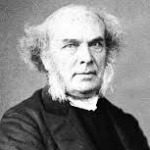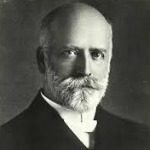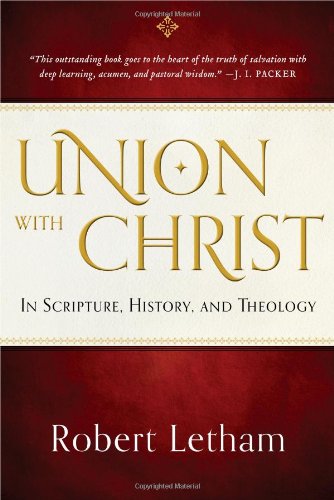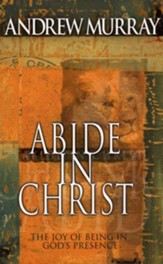Quotes about Jesus_Christ-Union
Upon a life I did not live, upon a death I did not die; another’s life, another’s death, I stake my whole eternity.
Because we are united by faith to [Jesus Christ] who is perfectly righteous, God accepts us as perfectly righteous. God does not resort to some kind of legal fiction, calling something righteous that is not. Rather, He declares us righteous on the basis of the real accomplished righteousness of Christ, imputed to us because of our union with Him.
Copied from The Gospel for Real Life by Jerry Bridges, © 2002, p. 103. Used by permission of NavPress – www.navpress.com. All rights reserved. Get this book!
We can distinguish [the] two aspects of our union with Christ this way: Our legal union with Christ entitles us to all that Christ did for us as He acted in our place, as our substitute. Our vital union with Christ is the means by which He works in us by His Holy Spirit. The legal union refers to His objective work outside of us that is credited to us through faith. The vital union refers to His subjective work in us, which is also realized through faith as we rely on His Spirit to work in and through us. Though our union with Christ has two aspects, it is one union. We cannot have legal union without also having vital union. If through faith we lay hold of what Christ did for us, we will also begin to experience His workings in us.
Copied from The Gospel for Real Life by Jerry Bridges, © 2002, p. 39. Used by permission of NavPress – www.navpress.com. All rights reserved. Get this book!
Having become with us the Son of Man, He has made us with Himself sons of God. By His own descent to the earth He has prepared our ascent to heaven. Having received our mortality, He has bestowed on us His immortality. Having undertaken our weakness, He has made us strong in His strength. Having submitted to our poverty, He has transferred to us His riches. Having taken upon Himself the burden of unrighteousness with which we were oppressed, He has clothed us with His righteousness.
Because of our union with Christ, we are not hated. Weakness, wrongdoing, and failings cling to us, yes. But they do not establish who we are. We are the beloved of God. Though sin still exists in our lives, we have the status of the One who gave his life for us and to us – God’s own Son. And because of the love of that Child who now indwells us, we have the ability to change and progress in our Christian walk. Yes, there is still work to do, but as we seek to obey our God we must remember that we can obey him because of who we are. We are God’s beloved children for whom he gave his Son, and to whom he has given his Spirit. As the Bible says, “How great is the love the Father has lavished on us, that we should be called children of God! And that is what we are!” (I John 3:1).
Holiness by Grace, Crossway Books, p. 65. Get this book!
We should understand that, fundamentally, our faith is not about what we do (as important as that is), nor is it about what we think (as important as that is). Our faith is fundamentally strengthened by understanding who we are through the indwelling Christ. We are who we are because of our union with Him. Nothing else can be the integration point (the place where the promises of Scripture and our identity intersect) of true spirituality. If we make what we do (right actions) the integration point of our faith, then we become fundamentalist and Pharisaical, with the judgement of others’ misbehaviors the preoccupation of our religion. If we make what we think (right doctrine) the integration point of our faith, then we become rationalistic debaters with judgement of other’ faulty doctrine the preoccupation of our religion.
Union with Christ is the central doctrine of how God dwells with us. That union is the work of the Holy Spirit, sent from Christ’s throne in glory. We are not only united to Christ as our representative, living, dying and rising for us; we are also united to Christ vitally by the presence of His Spirit. He has not left us as orphans. He comes to us, and He dwells among us in our hearts and in our gatherings as His church.
The union isn’t physical, but theological. Union with Christ implies three things: solidarity (Christ as the second Adam is our representative), transformation (Christ by the Holy Spirit changes us from the inside out), and communion (Christ abides with us as our God). Union with Christ is like wedlock, where we are joined to Christ in a covenant of love. It is like a body where we as members are joined to our living Head. Or you might say union with Christ is like a building, where we are the house and Christ dwells within us.
Be Who You Are by Kevin DeYoung taken from The Hole in Our Holiness by Kevin DeYoung, copyright 2012, Crossway Books, a division of Good News Publishers, Wheaton Illinois 60187, www.crosswaybooks.org, p. 96.
Just as the three persons of the Trinity share a union but are three distinct persons, and the two natures of Christ are united but remain distinct natures, so Christ has union with us without obliterating our own unique personhood. We do not become gods.
Be Who You Are by Kevin DeYoung taken from The Hole in Our Holiness by Kevin DeYoung, copyright 2012, Crossway Books, a division of Good News Publishers, Wheaton Illinois 60187, www.crosswaybooks.org, p. 97.
We must always remember that union with Christ is possible because of the Son’s descent to earth, not because of our ascent into heaven. The basis of our union with Christ is Christ’s union with us in the incarnation. He became one with us so that we might become one with Him.
Be Who You Are by Kevin DeYoung taken from The Hole in Our Holiness by Kevin DeYoung, copyright 2012, Crossway Books, a division of Good News Publishers, Wheaton Illinois 60187, www.crosswaybooks.org, p. 98.
Apart from our union with Christ every effort to imitate Christ, no matter how noble and inspired at the outset, inevitably leads to legalism and spiritual defeat. But once you understand the doctrine of union with Christ, you see that God doesn’t ask us to attain to what we’re not. He only calls us to accomplish what already is. The pursuit of holiness is not a quixotic effort to do just what Jesus did. It’s the fight to live out the life that has already been made alive in Christ.
Be Who You Are by Kevin DeYoung taken from The Hole in Our Holiness by Kevin DeYoung, copyright 2012, Crossway Books, a division of Good News Publishers, Wheaton Illinois 60187, www.crosswaybooks.org, p. 100.
The expression “in Christ” sums up as briefly and as profoundly as possible the inexhaustible significance of man’s redemption. It speaks of security in Him who has Himself borne in His own body the judgment of God against our sin; it speaks of acceptance in Him with whom alone God is well pleased; it speaks of assurance for the future in Him who is the Resurrection and the Life; it speaks of the inheritance of glory in Him who, as the only-begotten Son, is the sole heir of God; it speaks of participation in the divine nature in Him who is the everlasting Word; it speaks of knowing the truth, and being free in that truth, in Him who Himself is the Truth. All this, and very much more than can ever be expressed in human language, is meant by being in Christ.
Once a man is united to God, how could he not live forever?
Faith…unites the soul with Christ, as a bride is united with her bridegroom. From such a marriage, as [the apostle] Paul says, it follows that Christ and the soul become one body, so that they hold all things in common, whether for better or worse. This means that what Christ possesses belongs to the believing soul, and what the soul possesses belongs to Christ. Thus Christ possesses all good things and holiness; these now belong to the soul. The soul possesses lots of vices and sin; these now belong to Christ… Now is not this a happy business? Christ, the rich, noble and holy bridegroom, takes in marriage this poor, contemptible and sinful little prostitute, takes away all her evil and bestows all His goodness upon her! It is no longer possible for sin to overwhelm her, for she is now found in Christ.
A believer may pass through much affliction, and yet secure very little blessing from it all. Abiding in Christ is the secret of securing all that the Father meant the chastisement to bring us.
Union with Christ is really the central truth of the whole doctrine of salvation not only in its application but also in its once-for-all accomplishment in the finished work of Christ.
Union with Christ is really the central truth of the whole doctrine of salvation not only in its application but also in its once-for-all accomplishment in the finished work of Christ. Indeed the whole process of salvation has its origin in one phase of union with Christ and salvation has in view the realization of other phases of union with Christ.
There is a great difference between realizing, “On that Cross He was crucified for me,” and “On that Cross I am crucified with Him.” The one aspect brings us deliverance from sin’s condemnation, the other from sin’s power (John Mantle).
It is profitable to me to know that for my sake Christ bore my infirmities, submitted to the affections of my body, that for me and for all He was made sin and a curse, that for me and in me was He humbled and made subject, that for me He is the Lamb, the Vine, the Rock, the Servant, the Son of a handmaid, knowing not the day of judgment, for my sake ignorant of the day and the hour (Ambrose).
Every true believer in Jesus is united with Christ in His death, burial, and resurrection. By God’s grace, the believer actually participates in Jesus’ death, which destroys the penalty and power of sin. The Christian participates in Jesus’ burial, which leaves the old sinful person behind in the grace. The believer comes alive in Jesus’ resurrection, which makes Him a new person sharing in the new life of Christ.
Counseling the Hard Cases, Edited by Stuart Scott and Health Lambert, B&H Publishing, 2012, p. 159, Used by Permission.
The subject of spiritual union is the most important, the most profound, and yet the most blessed of any that is set forth in the sacred Scriptures; and yet, sad to say, there is hardly any which is now more generally neglected. The very expression “spiritual union” is unknown in most professing Christian circles, and even where it is employed it is given such a protracted meaning as to take in only a fragment of this precious truth.
Spiritual Union and Communion, Baker, 1971, p. 7.
Get this book!
This is the stunning message of Christianity; Jesus died for you so that He might live in you. Jesus doesn’t merely improve your old nature; He imparts to you and entirely new nature – one that is completely united with His.
Taken from Follow Me by David Platt. Copyright © 2013 by David Platt. Used by permission. Website: Radical.net. Page 65.
The day may come when after a long fight with disease, we shall feel that medicine can do no more, and that nothing remains but to die. Friends will be standing by, unable to help us. Hearing, eyesight, even the power of praying, will be fast failing us. The world and its shadows will be melting beneath our feet. Eternity, with its realities, will be looming large before our minds. What shall support us in that trying hour? What shall enable us to feel, “I fear no evil”? (Psalm 23:4). Nothing, nothing can do it but close communion with Christ. Christ dwelling in our hearts by faith. Christ putting His right arm under our heads. Christ felt to be sitting by our side. Christ can alone give us the complete victory in the last struggle.
We must seek to know something of heart-felt, experimental communion with Him. Never, never let us forget, that “union” is one thing, and “communion” another. Thousands, I fear, who know what “union” with Christ is, know nothing of “communion.”
Abide in Me says Jesus. Cling to Me. Stick fast to Me. Live the life of close and intimate communion with Me. Get nearer to Me. Roll every burden on Me. Cast your whole weight on Me. Never let go your hold on Me for a moment. Be, as it were, rooted and planted in Me. Do this and I will never fail you. I will ever abide in you.
Union with Christ – this is the sum and substance of the Christian’s status, the definition of his relationship to Jesus, the large reality in which all the nuances of his new being are embraced.
We, the unclean, are not just washed; we are in the Holy One forever. We, the rebellious, are not just pardoned; we are in the King forever. We, the sad, are not just encouraged; we are in the Blessed One forever. We, the defeated, are not just empowered; we are in the Victor forever. We, the confused, are not just instructed; we are in the Sage forever. This is radical reconciliation, full provision, an astounding advantage. This is how the Jesus who lived 2000 years ago becomes our living Friend and Power today – union with Christ. God announces to us that He has relocated us in His universe of grace. We are no longer outside Christ, and now not just before Christ or near Christ or beneath Christ, but in Christ. Let’s inhale deeply from this new environment.
The union of believers is grounded in the mystical union of Christ and His Church. The Bible speaks of a two-way transaction that occurs when a person is regenerated. Every converted person becomes “in Christ” at the same time Christ enters into the believer. If I am in Christ and you are in Christ, and if He is in us, then we experience a profound unity in Christ.
Immanuel, God with us in our nature, in our sorrow, in our lifework, in our punishment, in our grave, and now with us, or rather we with Him, in resurrection, ascension, triumph, and Second Advent splendor.
Christ and we will never be one until we and our sin are two.
Christ is the cause of the greatest division, but He is also the medium of the greatest union.
Union with Christ – this is the sum and substance of the Christian’s status, the definition of his relationship to Jesus, the large reality in which all the nuances of his new being are embraced.
Christ lives in us to manifest His life through us. Christ in us accomplishes His own purposes. Part of His purpose is intimacy with us, but His plan encompasses more than that. He is working toward His own ends, and we are the vessels through which He works. We are the visible manifestation of what God is doing, with Himself as the ultimate goal, “that God may be all in all” (I Corinthians 15:28).
Jesus is the Lamb slain from before the foundation of the world. In the seen and temporal, He was the lamb slain 2000 years ago. In the unseen and eternal, He has always been the slain Lamb. In the seen and temporal realm, you and I live physically right now. In the unseen and eternal realm, you and I were crucified on the cross with Christ. Our old man, inherited from Adam, dead to and separated from God, died with Him.
Being a Christian involves a personal, vital identification with Jesus Christ, and this union with Him is dramatically set forth in our baptism.
Jesus has many who love his kingdom in heaven, but few who bear his cross. He has many who desire comfort, but few who desire suffering. He finds many to share his feast, but few his fasting. All desire to rejoice with him, but few are willing to suffer for his sake. Many follow Jesus to the breaking of bread, but few to the drinking of the cup of his passion. Many admire the miracles but few follow him to the humiliation of his cross. Many love Jesus as long as no hardship touches them… They who love Jesus for His own sake, and not for the sake of the comfort for themselves, bless Him in every trial and anguish of heart, no less than in the greatest joy. And were He never willing to bestow comfort on them, they would still always praise Him and give Him thanks.
When Jesus died, He died as my representative, and I died in Him; when He arose, He rose as my representative, and I arose in Him; when He ascended up on high and took His place at the right hand of the Father in the glory, He ascended as my representative and I ascended in Him, and today I am seated in Christ with God in the heavenlies. I look at the cross of Christ, and I know that atonement has been made for my sins; I look at the open sepulcher and the risen and ascended Lord, and I know the atonement has been accepted. There no longer remains a single sin on me, no matter how many or how great my sins may have been.
“Christ in you, the hope of glory.” I’m not afraid of the devil. The devil can handle me – he’s got judo I never heard of. But he can’t handle the One to whom I’m joined; he can’t handle the One to whom I’m united; he can’t handle the One whose nature dwells in my nature.
We are not God’s children because we imitate God, rather we imitate God because we are His children. We do not "walk in love" so that God will love us. Rather, we walk in love because God has loved us. We do not "let our light shine" (upon the deeds of darkness) so that we’ll be made "children of light". Rather, we let our light shine because we are children of light. There are ramifications of being united to Christ (if we are united to Him!) and they cannot be avoided.




























